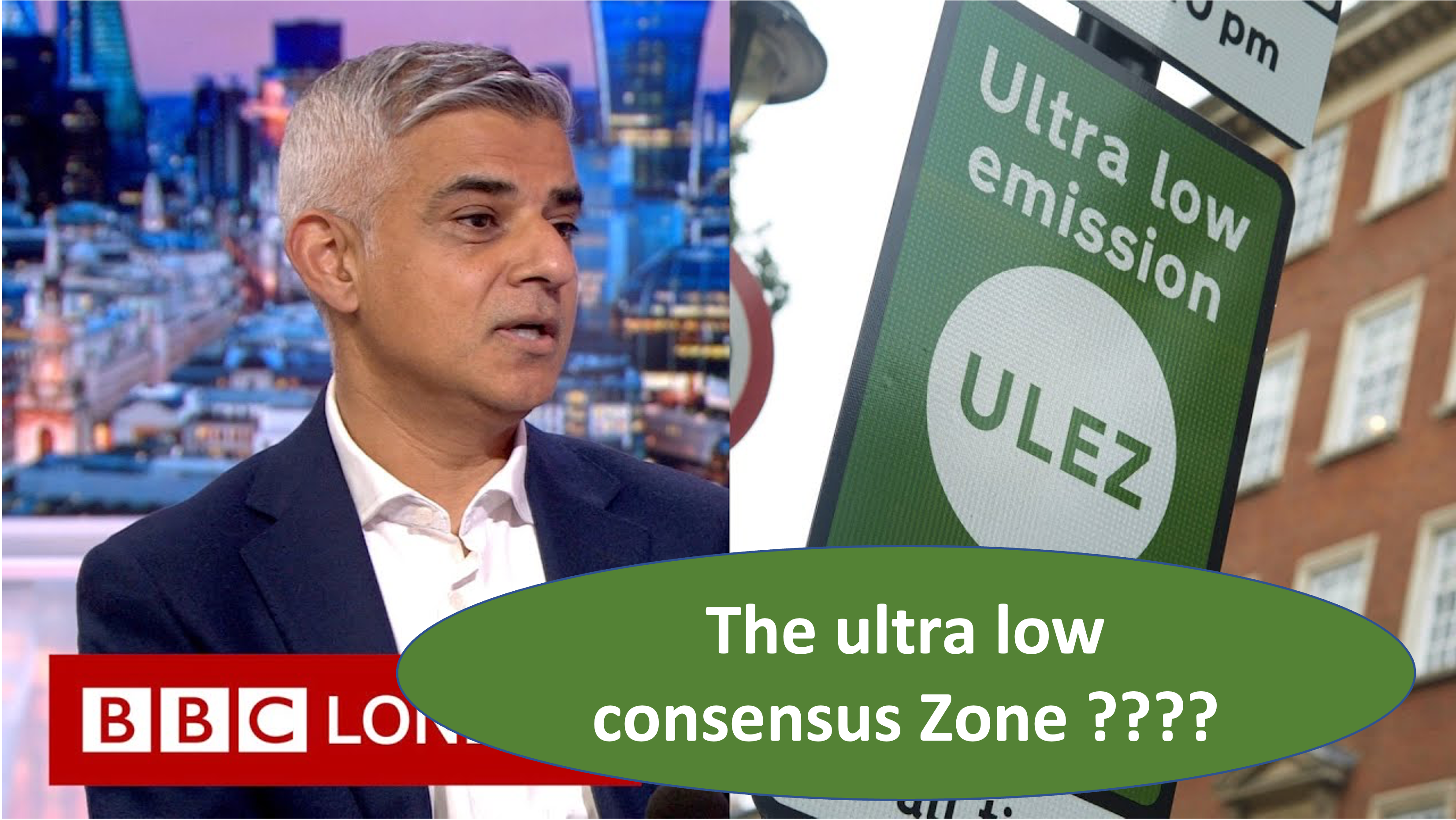This is Blog No 14
Battle-lines have been firmly drawn in the increasingly bitter row between the Mayor of London and his Conservative opponents.

Sadiq Khan argues passionately that his massive extension of the Ultra low Emission Zone (ULEZ) to cover the entire London area is an essential element of his Clean Air strategy. He cites the opportunity to save thousands of citizens from disease and death arising from unacceptable levels of vehicle emissions; he claims that the inner London Low Emission Zone works well, improves air quality, reduces traffic congestion, and encourages the modal shift from private cars to public transport.
The new proposals will extend the area covered hugely, and very far beyond the congested streets of central London. In the most rural areas around Biggin Hill or the borders with Kent or Essex, air quality is good, and local people resent the imposition of a £12.50 daily charge for any motorist who uses a non-compliant (generally pre-2015) vehicle.
London’s Conservatives insist that the alleged £400m budget for cleaning the city’s air could be spent better, and that this ‘punitive and unpopular’ charge is an unwelcome tax on those who can least afford it – at a time of a cost-of-living crisis. They point to an impact assessment that is vague and unspecific about the extent of hardship to be caused to such people. In fact, what it says is:
There is also the potential for negative impacts on for people on low incomes travelling by
private vehicle in outer London to access employment or opportunities due to their lesser
capacity to switch to a compliant vehicle and/or, depending on their location of employment
or working hours, to change mode.
The implementation of this revision would have some negative impacts however at
this strategic level it would not change the minor to moderate positive score identified
in the previous assessment.
Hardly a specific analysis. We are still guessing how many people will be impacted and how badly!
Then there is a broadside against the consultation – which took place in 2022 and which attracted over 57,000 respondents. Not very impressive, given that it covered the whole of Greater London, but not hopeless. Four London Boroughs (Bexley, Bromley, Harrow, and Hillingdon) are about to seek a Judicial Review arguing that Sadiq Khan has taken insufficient notice of the weight of opposition. There is also an (unverified) allegation that 5,000 valid responses were ‘not counted’ in County Hall – reminiscent of the days of Donald Trump.
It is getting messy. This week, the Daily Mail was forced to retract an allegation that 80% opposed the ULEZ; the figure turned out to be ‘80% of business-owners.’ Insults are flying in both directions. One newspaper alleged that the Mayor had said that Conservatives don’t care about children’s lungs!
It need not be like this.
Serious behaviour changes and new societal norms need to carry public opinion with them to the greatest extent possible, and the traditional sense of British ‘fair play’ will be to the fore. In particular, we need to start borrowing useful concepts from analogous situations. I am particular keen to see greater thought given to the idea of JUST TRANSITION. Initially developed by labour unions in North America, it is about ‘greening the economy in a way that is as fair and inclusive as possible to everyone.’
But it has wider application than looking after workers displaced by the closure of fossil-fuel industries. So many of the initiatives demanded by our moves towards net zero and healthier/better environments have the potential to hurt most, those that are disadvantaged. Data from consultations on proposals such as the ULEZ in London show that the public is sympathetic and supportive but are anxious that steps have to be taken to provide an equitable programme of mitigations. The Mayor obviously understands this and probably realises that his £110m vehicle scrappage scheme is far too little and too restrictive.
He wishes to implement the new extended area in August this year. He has more hurdles to navigate and needs to engage with his critics. But the debate has moved on. Consultation is no longer the main issue.
Fundamentally, this is political decision-making. It is about choices, resources and priorities. The consultation did matter – it helps to know what stakeholders think and prefer. But it was just part of a wider process of political engagement. That must continue; everyone benefits if the debate is well-informed and protagonists listen constructively to each other.
It’s just not yet happening in London ….
See Rhion's Speeches, Talks and Presentations.
For More like this - free of charge: SUBSCRIBE now